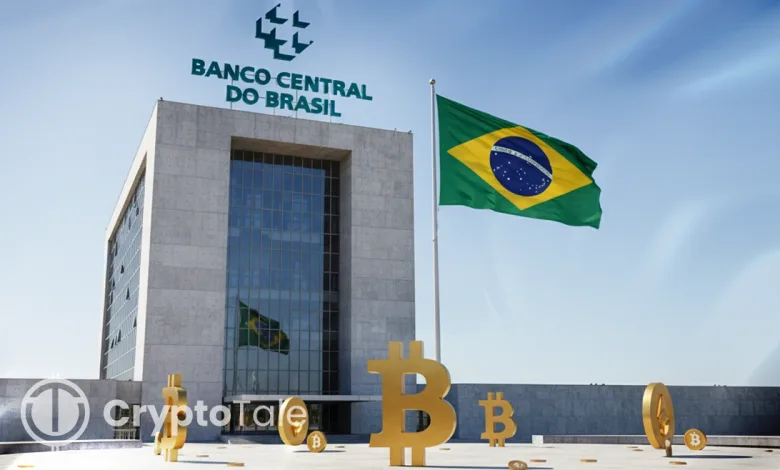Brazil Central Bank Unveils Crypto Rules to Curb Illicit Use

- Brazil classifies stablecoins as foreign exchange under the new crypto regulations.
- Crypto firms must gain central bank approval or halt operations by November 2026.
- The framework aligns Brazil’s crypto sector with FATF global compliance standards.
Brazil’s central bank on Monday, November 10, introduced new regulations for virtual assets, extending anti-money laundering and counter-terrorism financing standards to crypto service providers. The measures, unveiled in Brasília, are the first major overhaul since the 2022 crypto law and aim to close regulatory gaps as stablecoin use surges across Latin America’s largest economy.
Stablecoins Classified Under Foreign Exchange
The new rules, effective February 2026, classify any purchase, sale, or exchange of fiat-pegged stablecoins as foreign exchange operations. This extends to international payments or transfers using crypto, including card settlements and electronic payments.
According to the central bank, the framework aligns the digital asset market with Brazil’s traditional financial regulations to prevent misuse of digital assets for illegal transfers or tax evasion.
Authorities say the regulations will also cover foreign exchange and securities brokers, distributors, and other virtual-asset service providers. Each will now require authorization from the central bank before operating.
Gilneu Vivan, the bank’s director of regulation, said the rules will “reduce the scope for scams, fraud, and the use of virtual asset markets for money laundering.” Under the resolution, if a crypto transaction involves an unauthorized counterparty, it will be capped at $100,000.
The new rules also bring in requirements for good governance, strong cybersecurity, and transparency. Crypto firms must set up proper compliance and risk management systems similar to those used in traditional banks and financial institutions.
Brazil Sets Strict Compliance Deadlines
All crypto service providers, such as exchanges, custodians, and brokers, must get approval from the central bank by November 2026 or stop operating. They have nine months to meet the new standards, which include tough cybersecurity and incident-reporting measures.
Institutions that fail to meet the standards will be barred from operating within the country. These measures follow growing concern over stablecoin transactions, which officials say dominate Brazil’s crypto activity.
In February, central bank governor Gabriel Galipolo reported that nearly 90% of domestic crypto flows are linked to stablecoins. He noted that many are used to bypass supervised financial systems or traditional payment channels that face higher taxes and stricter compliance checks.
Policymakers, including Galipolo, argue that while stablecoins remain less volatile than cryptocurrencies like Bitcoin, their expanding role in payments has created regulatory blind spots. The central bank’s initiative, therefore, seeks to ensure that digital assets are no longer exploited for illicit activity while still allowing innovation in digital finance.
Related: Nubank Tests Stablecoin Payments via Credit Cards in Brazil
Brazil as Latin America’s Crypto Leader
Brazil’s crypto market is outpacing its regional peers. The country ranks fifth globally in crypto adoption as of 2025, up from tenth the previous year. Between July 2024 and June 2025, Brazil handled about $318.8 billion in crypto transactions, nearly one-third of all Latin American activity.
The central bank’s new framework builds on the 2022 crypto law that provided the sector’s legal foundation but required complementary regulation. After four rounds of public consultations, the bank finalized the structure to enhance transparency, protect consumers, and bring virtual-asset operations under closer supervision.
Gilneu Vivan said during a press conference that the expanded framework will “tighten oversight and strengthen institutional trust in Brazil’s digital economy.” The rules are also expected to align Brazil’s financial system with international compliance standards used by the Financial Action Task Force (FATF).
The timing coincides with the country’s broader discussions on digital finance. Brazil’s Congress is discussing Bill 4501/24, which suggests creating a $19 billion Bitcoin reserve called RESBit. The goal is to diversify the country’s assets and reduce dependence on the U.S. dollar. If approved, Brazil would join other nations looking at Bitcoin as part of their financial reserves.
The central bank’s recent move marks a shift toward clearer digital asset rules. By treating stablecoins as foreign exchange and tightening control on crypto service providers, Brazil hopes to encourage innovation while keeping the system safe and transparent. The plan, set to start in February 2026, aims to build a fair and secure crypto environment that supports genuine use and limits illegal activities.




